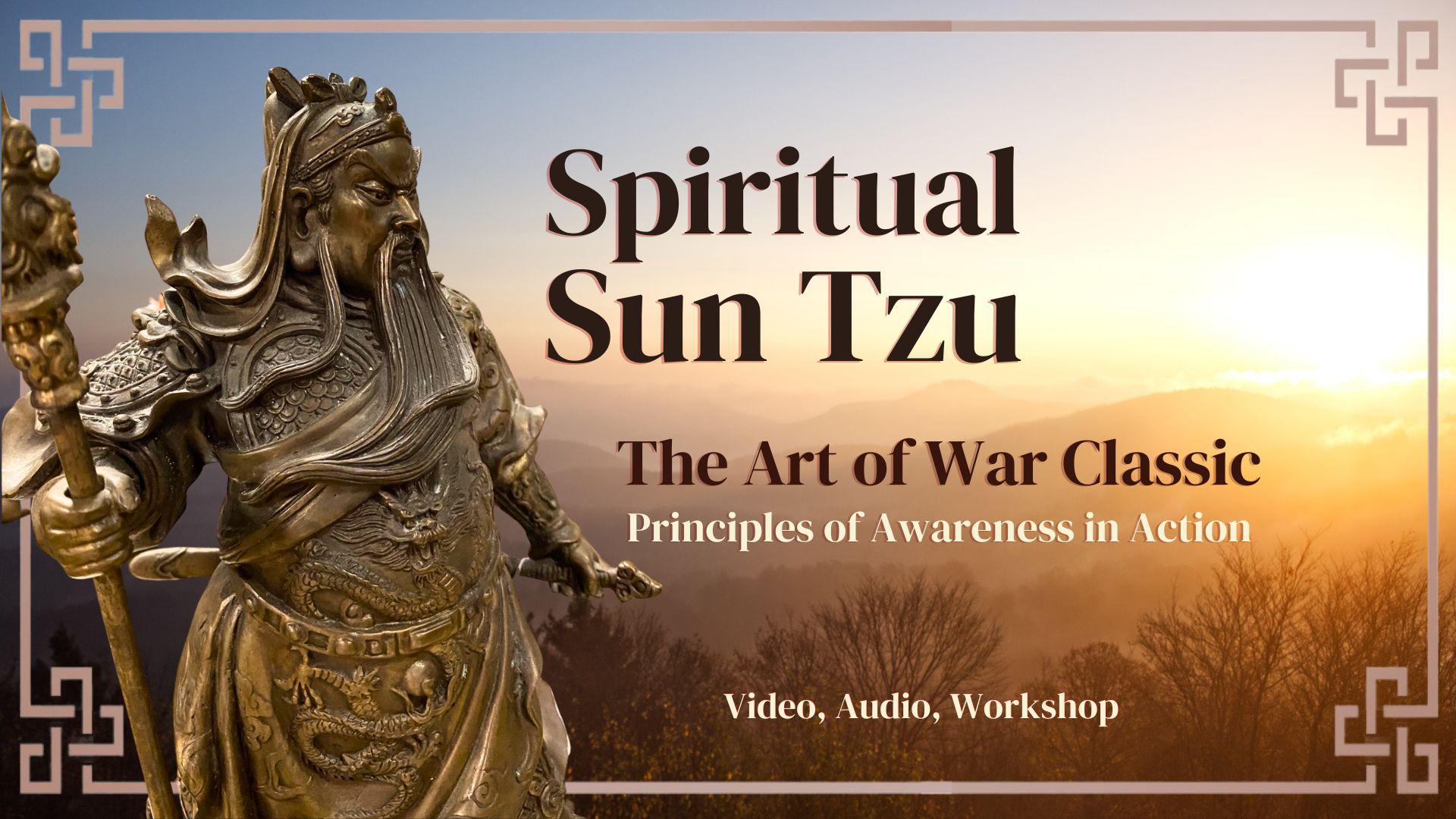
Strategic thinking for evolving minds. What should you do if you suddenly find yourself immersed in a SPIRITUAL WAR? You’re getting crossfire in a clash of the ages between Dark vs. Light, Good vs. Evil? What are the rules of the game? What’s your modus operandi? Your map?
The goal of this Sun Tzu training is to seed a new generation of WARRIORS of the HEART, with a clear spiritual principles of “Yin Yang”, which some call “Emptiness vs. Fullness”. What are the essential skills of a spiritual warrior? These qualities include mental resilience, courage, passion, and a sense of higher destiny.
This training introduces strategies in creative thinking, precision, subterfuge, leadership, and harmony to apply ancient wisdom in every sphere of life, not just war. It teaches planning, visualization, mental agility, and how to keep your heart open in the face of challenge.
Each of the 13 Chapters of the Sun Tzu ART OF WAR includes;
- Video of main points, narrated by Lama D of Bhutan.
- Video of an event that illustrates the principles in modern times, with Srijana.
- Quiz / Memory Test.
- Optional Live Q&A with group problem solving.
Part I – Introduction – Historic Perspective
The Art of War was a classic text written by General Sun Tzu in the 6th century BCE, a time of terrible violence all over the world. Yet even in the midst of brutal war, a tradition of high Daoist philosophy and enlightened understanding had already infused Chinese wisdom. How is this possible?
To engage in war with wisdom and love seems like a total contradiction. And this is the very great gift of the book by Sun Tau.
The Art of War outlines concepts and skills useful in any exchange, not just military action. These skills apply to every level of relationship, interpersonal, professional, family, and global interactions. Our goal is to make you invincible, ethical, humane, and victorious, even without going to battle. These tactics and principles encompass every arena of life, including the physical sciences, politics, psychology, art, and spiritual ascension.
The subject of the book is WAR, however it is much more than that. A better title would be “The Art of NOT Going to War Unless You Absolutely Can’t Avoid It, And Even Then You Avoid Fighting as Much as Possible.”
Historically, the philosophical basis for Sun Tzu The Art of War is the Chinese concept of “Yin Yang”. We could call this “complementary opposites” to avoid cultural confusion around “Yin Yang”. However, Sun Tzu never used the terms “Yin Yang”. Instead he called these dual alternating elements “Emptiness and Fullness”.
Opposition is important, as all war deals with competing and counterbalancing forces. We can refine the concept even further in three areas:
- “Complementary Opposites” are the foundation of all existence. The “NOW” moment is a temporary stasis, a fleeting balance point reflecting the competing dual forces of chaos/order, matter/energy, space/time, mind/body, and all other complementary forces.
- These competing forces generate cycles of change. We can foresee the next steps in the natural order because we understand how the balance between these forces rises and falls over time. Day follows night. Booms lead to busts. Youth leads to age. Ignorance leads to knowledge.
- Gratefully, these forces insure stability in Nature, like the swing of a pendulum, where “too much” in any direction naturally moves to correct itself. The universe never descends into total chaos, because the constant, dual balance of all things naturally corrects all excesses. As one force grows stronger, the other grows weaker.
The Art of War was written in a time when military strategy was essential for the day-to-day survival of the people. Yet at the same time it integrates high philosophy of Daoist spirituality, peaceful humanism, along with practical techniques to stay alive and defeat vicious attackers under tough, life-threatening conditions. It requires a superior person with a high level of skill to live in balance with the highest moral law, and at the same time know how to preserve your physical life and that of all the people. Therefore, although it is a book of war, it is also a book of peace, and of understanding the deepest roots of conflict and harmony.
Therefore, The Tao of War challenges our most basic assumptions about human life, duality, conflict and peace.
What is VICTORY?
When we are in a WAR, we must carefully understand our GOAL.
If our GOAL is to WIN and SURVIVE, then many paths of action are available for us to choose.
Why KILL our opponent if it is not necessary?
Rather, we find the easiest path to WIN.
We may simply incapacitate our opponent, confuse, or circumvent their actions so they do not harm us.
Then we WIN our freedom and peace with the least destruction and death.
Chinese martial arts such as Kung fu, Qigong, Taichi, and Karate, are deeply rooted in Daoist spiritual wisdom of living in harmony and healing the body as a microcosm of the natural universal TAO. Many generations of the finest men strove to find strategies to turn disharmony into harmony. Their goal was to WIN by doing the least damage.
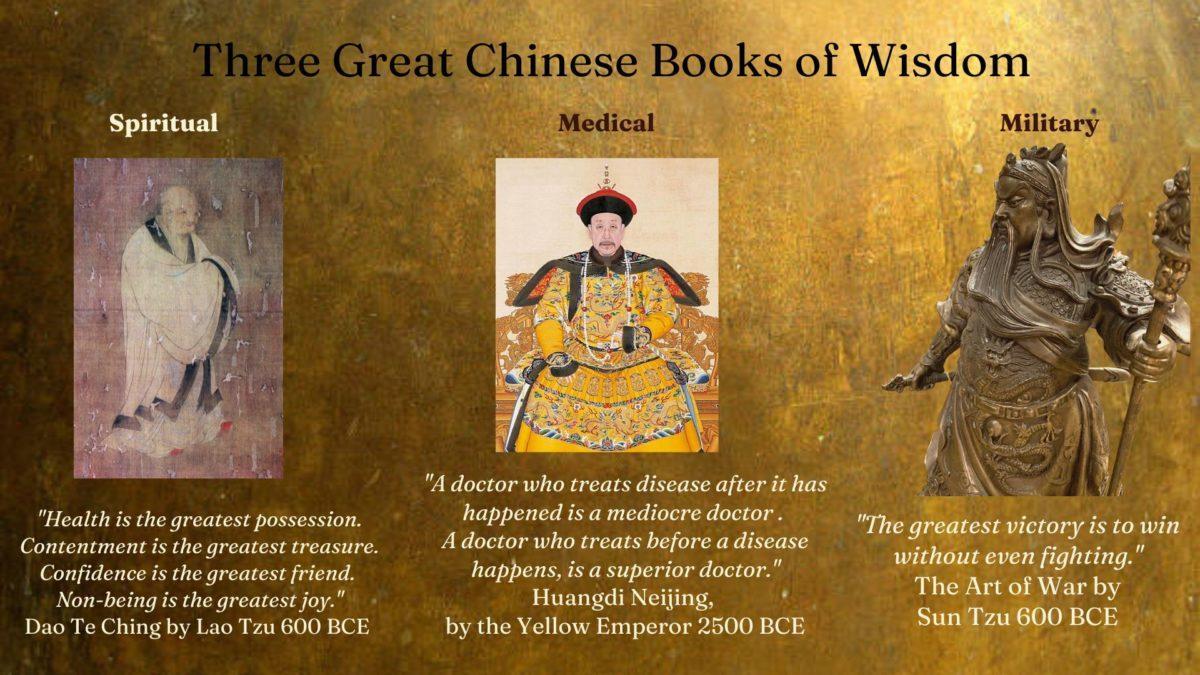
Three Great Chinese Books of Wisdom
The first medical textbook in the world was written by the Yellow Emperor in 2,500 BCE. This book is perhaps the most important ancient text of Chinese medicine. It outlines the TAO, also called the WAY. This book outlined Daoist theory and lifestyle in practical medical terms. The book is structured as a dialogue between the Yellow Emperor and his physician. It covers all aspects of how to maintain physical health through lifestyle, movement, diet, seasons, and the body meridians.
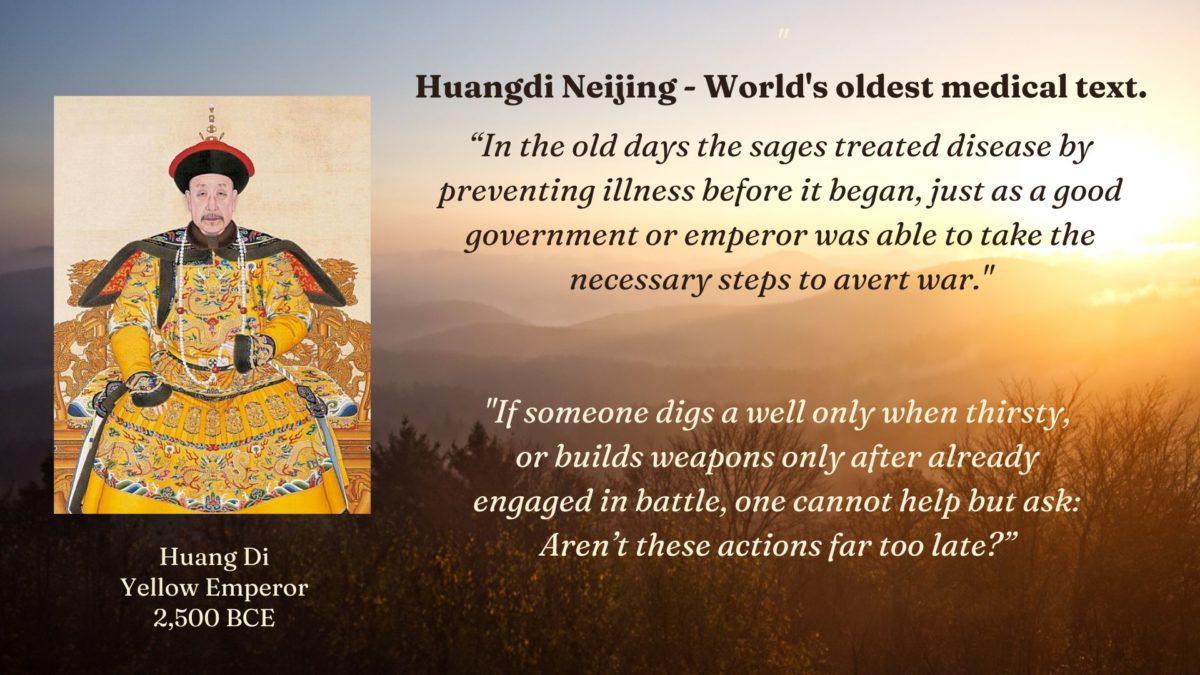
“In the old days the sages treated disease by preventing illness before it began, just as a good government or emperor was able to take the necessary steps to avert war. If someone digs a well only when thirsty, or forges weapons only after becoming engaged in battle, one cannot help but ask: Aren’t these actions far too late?” -Huang Di, the Yellow Emperor
This great book is called the Huangdi Neijing. It holds that disease develops only when we disregard the natural harmony of diet, lifestyle, emotions, seasons, and spiritual attitude. According to Neijing, the universe is composed of various forces and principles, such as the polarities of Yin and Yang, Energy (Qi), and the Five elements of Nature called Wuxing.
The Huangdi Neijing is over 4,500 years old. Chinese medical practice had developed over many thousands of years based on empirical study, anatomical observation, healing experience, as well as deep meditation on the laws of Nature that rule our bodies. Hence, it was not only a study the material aspects of the physical body, but also an esoteric study of how to enliven the spirit as a physical being. Yes, it encompassed both worlds. This is quite different from a materialist approach to healing the body as a purely physical material object. This is an important key to understanding the differences between Eastern and Western Medicine through the integration of the physical body with the spirit.
The Huangdi Neijing is the first and one of the only medical books that acknowledges the multi-dimensional nature of the body-mind-and spirit. That means that early Chinese Medicine treated health as a reflection of the universal harmony in body, the mind, and the spirit.
“In the past, people practiced the Tao, the mindful Way of Life. They understood the principle of balance of the Natural universe. They did exercises to promote energy flow to harmonize themselves with that. They ate a balanced diet at regular times, arose and retired at regular hours, avoided over-stressing their bodies and minds, and refrained from overindulgence of all kinds, and they lived over one hundred years. “These days, people have changed their way of life. They eat and drink without awareness, and drain the body energy. Seeking emotional excitement and momentary pleasures, people forget the natural rhythm of the universe. So it is not surprising that they look old at fifty and die soon after.”
“To cure disease after it has appeared is like digging a well when one already feels thirsty or forging weapons when you are already engaged in battle.”
The Yellow Emperor Huang Di Nei Jing 2,500 year-old Classic Medicine
Daoist Philosophy
Daoism is not a religion, as it doesn’t have a God with a name. Instead, Daoism views the TAO as the Supreme power and WAY of harmony in the natural universe. Man is a microcosm that mirrors the larger macrocosm. We live in a multi-dimensional universe that encompasses many levels of Spirit, Mind, and the Physical / Material world. Daoism proposes that when we understand how to live in balance with the Supreme power of Nature, we will experience good health and avoid all problems.
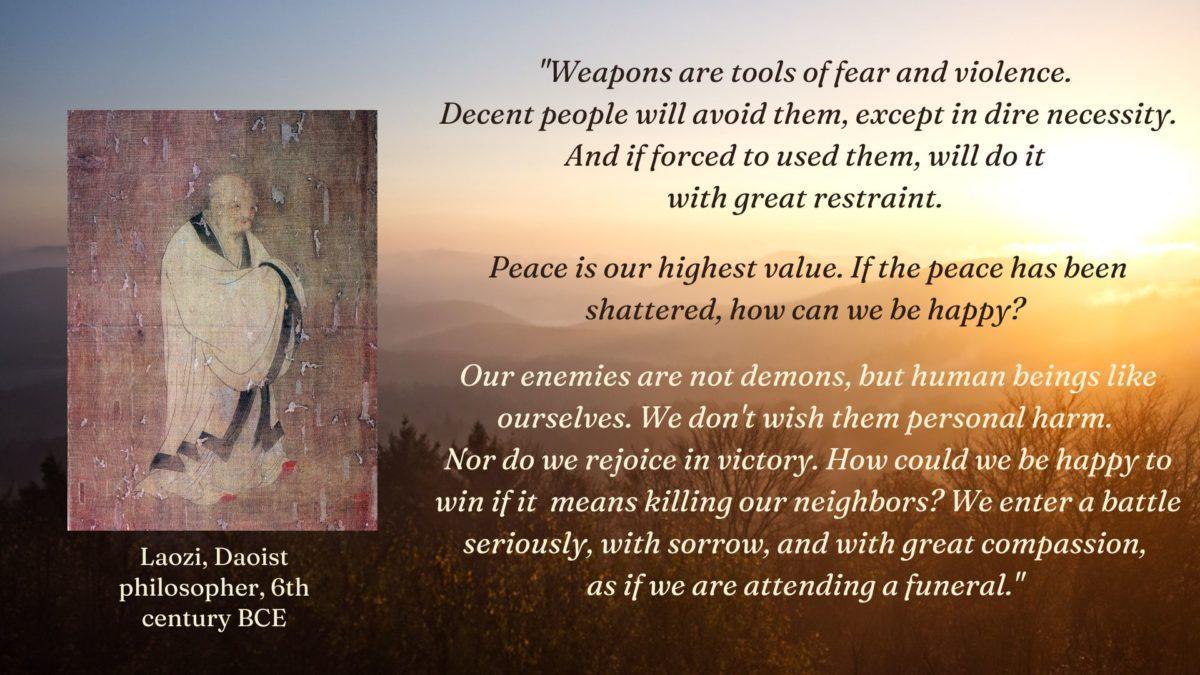
“Weapons are tools of fear and violence.
Decent people will avoid them, except in dire necessity. And if forced to used them, will do it with great restraint.
Peace is our highest value. If the peace has been shattered, how can we be happy?
Our enemies are not demons, but human beings like ourselves. We don’t wish them personal harm.
Nor do we rejoice in victory. How could we be happy to win if it means killing our neighbors?
We enter a battle seriously, with sorrow, and with great compassion, as if we are attending a funeral.” Lao Tzu
The Tao Te Ching is a classic Chinese text written around the 6th century BC by Laozi. This book is an important foundation of Daoism and one of the most important works of its time. Today it’s one of the most-translated works in the world.
The book consists of 81 short poems on a vast variety of subjects from advice to kings, to advice to common people for daily living. It comes from such a very high perspective of wisdom, that it can be interpreted and translated in so many ways. Isn’t that an interesting reflection on Chinese wisdom, and our lives as a microcosm of the Tao?
Master Sun Tzu said the superior warrior tries to win without violence.
Simply foil the opponent’s plans, or seed suspicion in his closest allies. These slightly deceptive actions can bring victory with no bloodshed. A less desirable option is to directly confront or attack your opponent. The most destructive way to victory would to shut down cities, blockade shipments, ruin the economy, and restrict movement of civilians. What examples of this can we see in modern times?
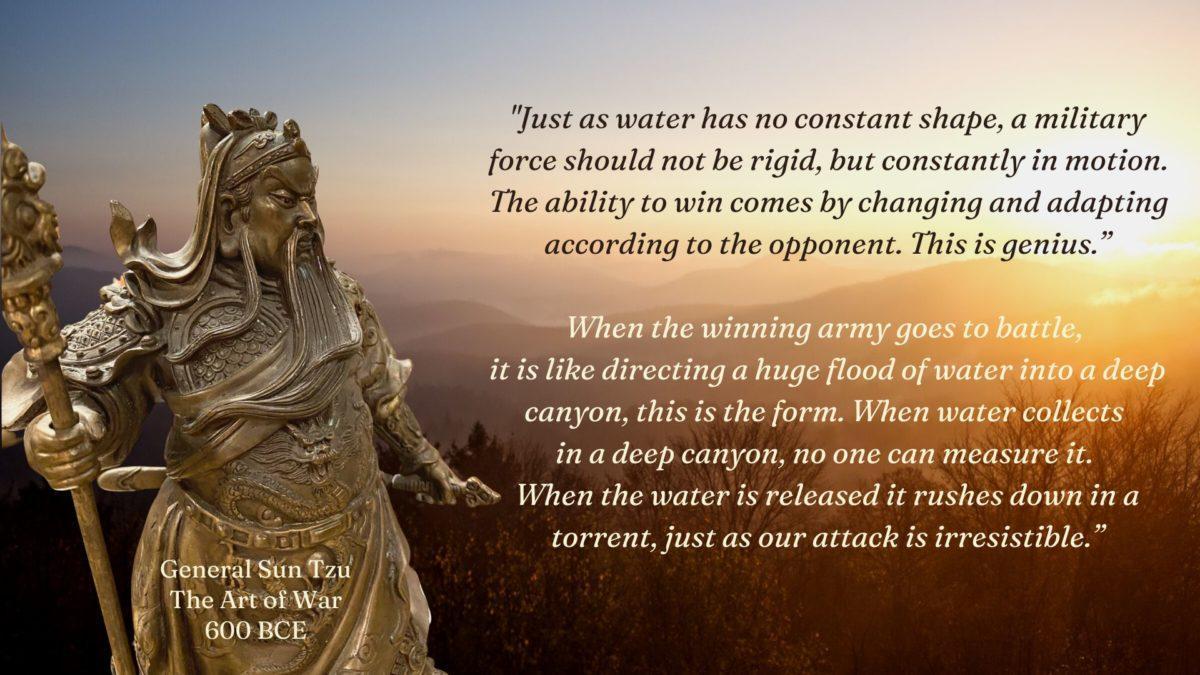
Sun Tzu uses WATER as a central theme and metaphor. “To behave like water is to be a Genius”, says Sun Tzu. Water is strong in both offense and defense. If you are standing in the ocean and waves roll around hitting you, if you strike or push the waves you’re just stupid – the water effortlessly flows around you to the easiest points. You can’t battle the water. It just flows away from where you are strong to wherever you are weaker. Water is at once full of power and empty has no form, impossible to attack and impossible to resist. This is a powerful concept to grasp.
“Just as water has no constant shape, a military force should not be rigid, but constantly in motion. The ability to win comes by changing and adapting according to the opponent. This is genius.”
When the winning army goes to battle, it is like directing a huge flood of water into a deep canyon, this is the form. When water collects in a deep canyon, no one can measure it. When the water is released it rushes down in a torrent, just as our attack is irresistible.” Sun Tzu, 600 BC
Chapter 1 –Strategic Assessment
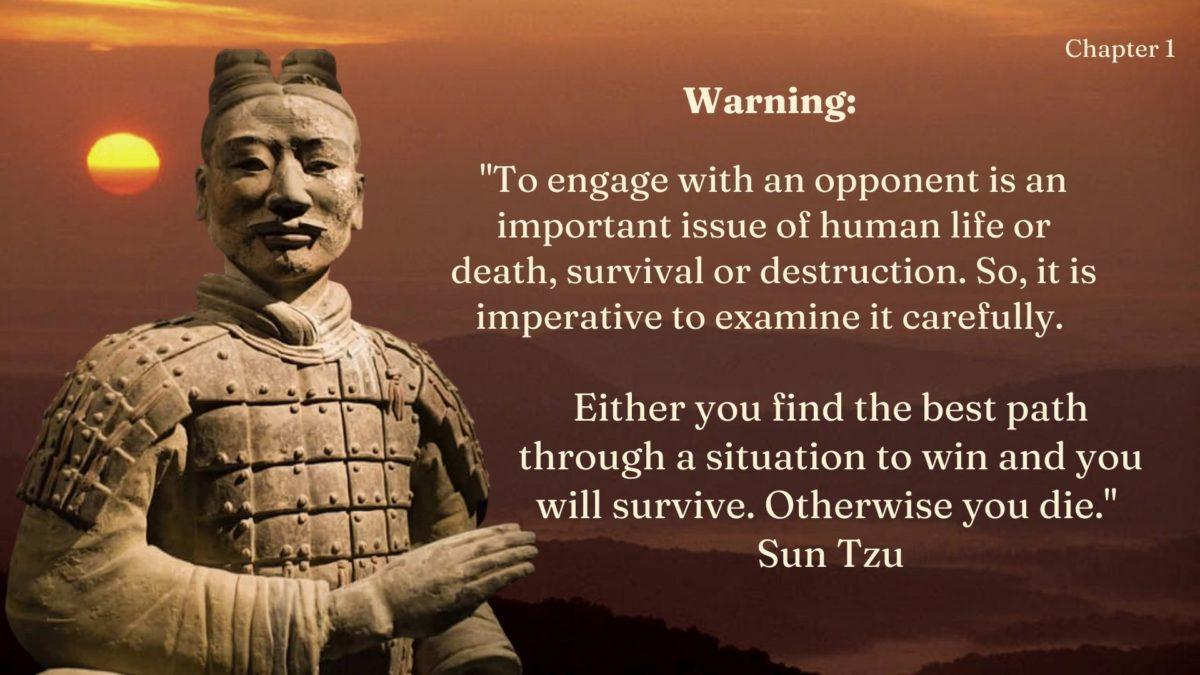
Warning: To engage with an opponent is an important issue of human life or death, survival or destruction. So, it is imperative to examine it carefully. Either you find the best path through a situation to win and you will survive. Otherwise you die.
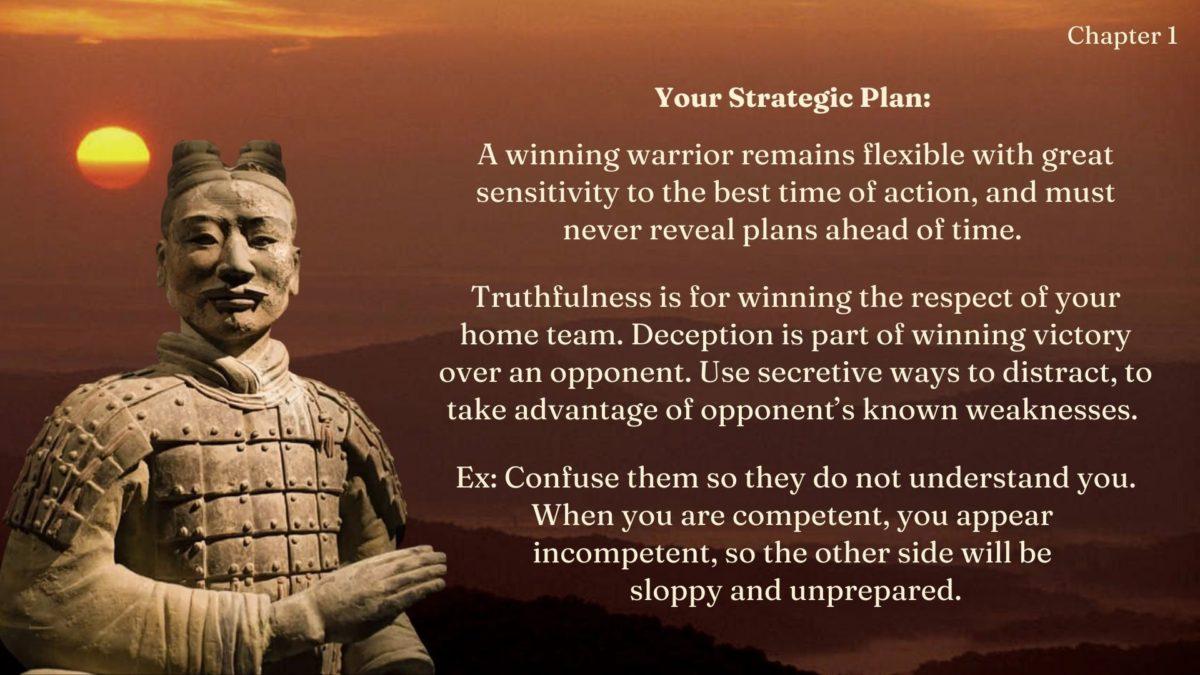
The Five Critical Factors: What are the most important factors that determine whether any action will win or lose? You must measure your strength in each of these areas. Then you calculate the opponent’s strength in the same factors.
- The Tao – Do You Follow the Way of Nature? Do you hold an ethical path of goodness, humaneness, and justice? Or is it cruel and selfish?
- Weather. Are the seasons in your favor? Is it wet or dry? Hot or cold? Planning supplies, food, and clothing depends on weather.
- Terrain: What is the lay of the land where we must safely travel and meet the opponent?
- Good Leadership: Do we have cohesive military intelligence, trustworthiness, humaneness, courage, and sternness?
- Discipline and Logistics: Are the teams and ranks organized reliably? Do we have proper logistics for sufficient supplies?
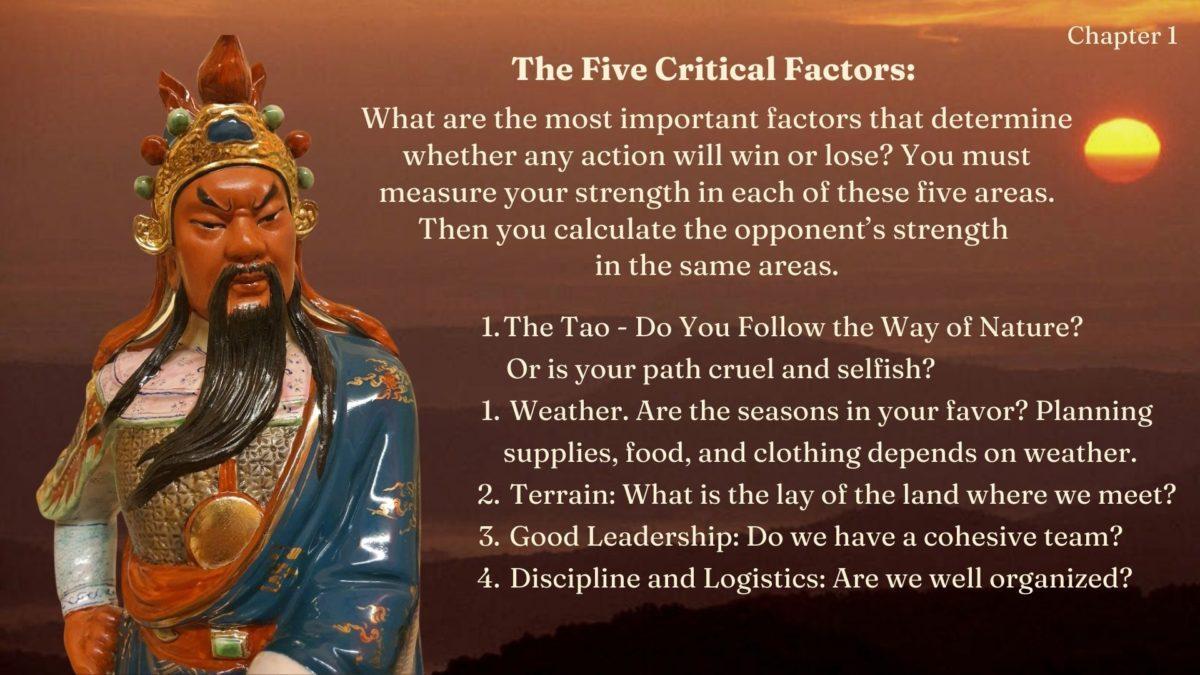
Your Strategic Plan: A winning warrior remains flexible with great sensitivity to the best time of action, and must never reveal plans ahead of time. Truthfulness is for winning respect of your home team. Deception is part of winning victory over an opponent. Use secretive ways to distract and strike at an opponent’s known weaknesses. Ex: Confuse him so that he does not understand you. When you are competent, you appear incompetent, so the enemy will be sloppy and unprepared.
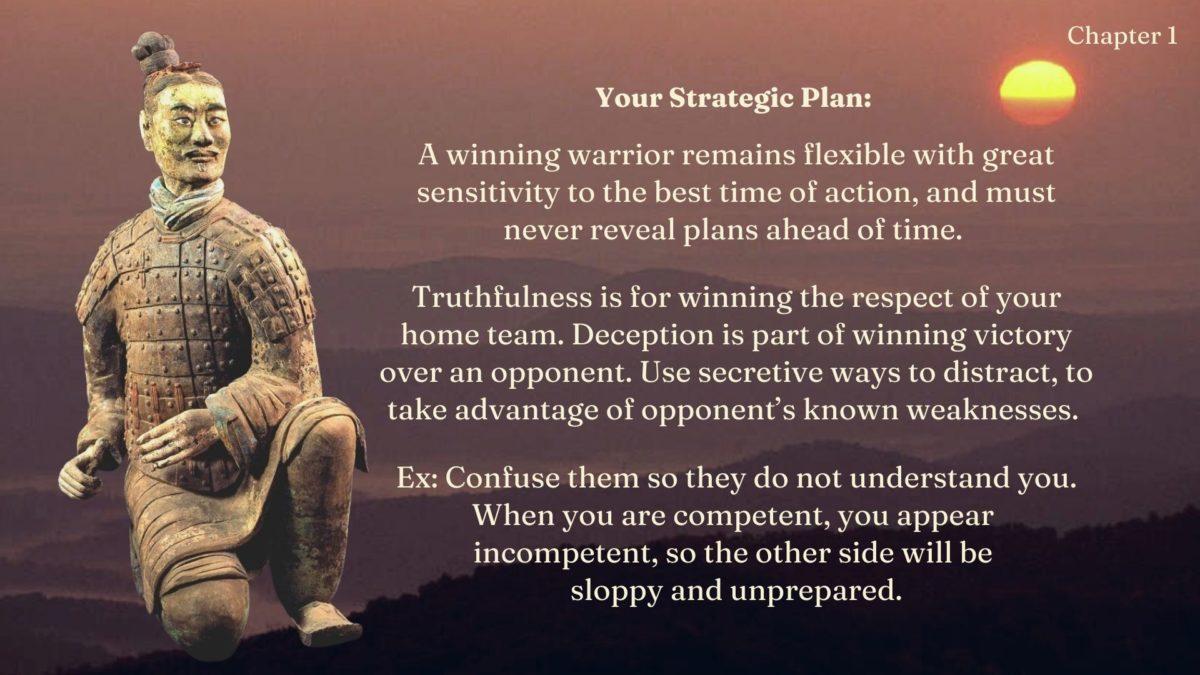
Once your goal is clear, you do your strategic planning. At this stage you examine all the probable results of a given action. If the situation is complex, you might need a quantum computer to calculate all the possible results. If your strategy is deep and you are prepared for all possible outcomes in the situation, you can win before any encounter. But if your strategic thinking is shallow or near-sighted, you will lost before you even begin to engage.
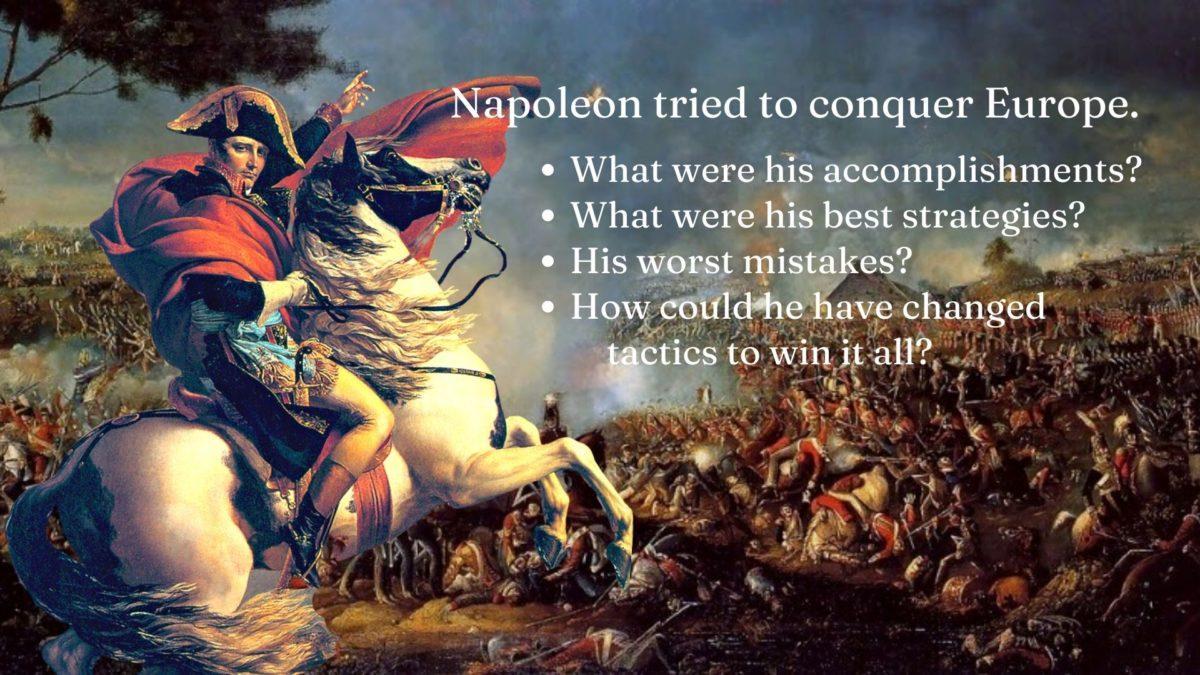
Step 3: A True Story:
Napoleon Bonaparte was a great military genius and French Emperor 200 years ago. In fact, he may be the greatest conqueror the world has ever seen. The French common people considered him a hero. But to the British and European monarchy, he was a mortal enemy, because Napoleon rallied the common folk in their own countries, and took almost of Europe. Eventually his military victories amassed a vast empire from Spain into Russia, Africa, Asia, and the Americas. The Napoleonic Wars lasted for 16 years from 1799 to 1815 in which the French Empire was pitted against British and royal allies for control of Europe and the world.
Napoleon was born to a middle-class family on the island of Corsica, which was under French control. In school he excelled in mathematics and attended a military academy. At that time Europe was seething with anger and dissatisfaction with the royal families that ruled Europe’s various nations and controlled trade for their own benefit.
In 1789 when the French Revolution broke out in Paris, it marked a great victory for the poor classes, who were tired of injustices, tyranny, and absolute power held by kings, queens, and aristocratic governments. With a French non-monarchy army in power, Napoleon rose through the ranks of the military winning victories at every opportunity.
Napoleon carefully studied the cultural and economic forces of the time and utilized this knowledge to win many battles. Inspired partly by the American revolution of 1776, many philosophers of the Age of Enlightenment proposed new laws, a Declaration of the Rights of Man and of the Citizens for a new the French constitution. The new philosophies supported women’s right to vote and the freedom for alternative groups such as actors, Jews, blacks, and slaves, plus a Parliament elected by commoners.
Napoleon succeeded in dismantling the governing body in France and set up a new government called The Consulate with himself as First Consul. In this time, he had instituted many popular reforms, such as free secondary education.
Napoleon had a brilliant grasp of economics and the world of money. He created the Bank of France to improve the stability of the empire. After carefully studying the roots of the French Revolution which blamed French royalty and led to their beheading by the guillotine, Napoleon came to the conclusion that it was covertly organized by the Jacobins, Masonic Lodges, and Freemason secret society financiers. Napoleon was wary of the power of financial interests and opposed national debt for his country. He criticized national debt, saying:
“When a government depends on bankers for money, the bankers are in control, not the government.”
Napoleon’s objective was to free Europe to break away from the growing power of Venetian rule of the British Monarchy, which was amassing all the wealth of the world. But he needed money. To finance his war and liberate Europe from debt, Napoleon sold to US President Jefferson a vast area of French land in the Midwest called the Louisiana Purchase, for three million dollars in gold. Napoleon used this money to finance his military operations, much to the distress of the royals.
“Money has no motherland. Financiers are without patriotism and without decency. Their sole object is financial gain.”
Napoleon’s great ambition was to free Europe “for the people”, and they rallied around him with great enthusiasm. Many common people preferred to fight for Napoleon rather than serve in the Royal Armies. In the end, Napoleon failed, but he almost succeeded in achieving his ambition. Napoleon’s loss at the Battle of Waterloo in 1815 eventually led to the consolidation of European banking under the British government with Mayer Amschel Rothschild. It took the entire royal cartel of British, Spanish, French, Russian, German, and assorted mercenaries to stop him, re-claiming Europe for the royal alliance.
One of Napoleon’s first acts as head of state was to bring the Catholic religion back to France after the atheistic years of the French Revolution. Pope Pius VII in 1801 saw it as a great return to God. But Napoleon’s relationship with Rome and the Holy Roman Empire as a sacred state, having its own lands and laws, all aligned with royal families, became complex. Relations with the Roman Empire turned out to be even more difficult than negotiating with a foreign country.
Continental System – Economic Sanctions Against England
Napoleon understood the power of money, and the objectives of British royalty. His policy towards England strove to bring the empire to total ruin. For this goal, Napoleon imposed financial sanctions against Britain, preventing all other countries from trading with her, to weaken her economy. He simply banned all European trade with England. Called the “Continental System”, this had a negative effect on England for a short time, however implementing it all over Europe and Russia became difficult. When a nation failed to follow the Continental system, Napoleon would often invade that country and occupy it with his troops to enforce the system with his troops. But unfortunately, this turned the people of that country against France and stretched Napoleon’s forces thinner. This was very problematic in Spain, Portugal, and Russia, who found plenty of ways to go around the trade embargo. Britain did not suffer too greatly, instead trading with other parts of their empire. The Continental System of sanctions was a very hard-nosed approach. Did Napoleon focus too narrowly on the ruin of England at all costs?
Napoleon’s accomplishments
Napoleon left many positive accomplishments. Hugely popular among the masses, he reformed the education system. He made Catholicism a state religion, while also assuring freedom of worship. He improved the commercial and industrial sectors. He reduced corruption and enhanced support from the government through loans from his Central Bank of France. Napoleon revised the tax system so that people were fairly taxed based on their assets, eliminating predatory practices. Napoleon created The Code Napoleon, a criminal, civil, commercial, military code along with penal code that completely modernized the legal system and served as a model for other countries.
Napoleon Created Better Medical Treatment for Soldiers
Before Napoleon’s time, men wounded in battle were often left on the battlefield for 24-48 hours until the conflict was over. As a result, thousands died from loss of blood and exposure to cold weather. Napoleon’s medical teams developed a 3-way system to prioritize and lightweight horse-drawn ambulances to carry wounded to treatment tents. These systems greatly reduced deaths during Napoleon’s wars. His French doctors held to high moral values and value for all life, treating friend and enemy equally. This principle of Napoleon’s is honored in the Geneva Convention.
In spite of Napoleon’s enormous success, he failed in his ultimate goal of building an empire. Perhaps there were a few strategic areas he was lacking. Some historians say he lacked strategic leadership skills, army strategy, naval strategy, economic strategy, and team consensus building. Perhaps overall, his greatest failure was that he tried to achieve his goals through military means alone. He failed to understand how to balance all the complex elements of power – economics, diplomacy, tactics, information, in order to win.
Napoleon was not able to build consensus with national leaders to meet common strategic goals. Napoleon was sometimes called a Classic Dictator, “He saw other people as instruments of his visions – and the higher he rose, the greater those visions became.”
Napoleon became an expert in the use of spies.
The most successful was his brilliant friend Schulmeister who infiltrated Austrian army intelligence and collected vital information, which he passed on to Napoleon via horseback. Schulmeister even passed on to Austrian General fake “secret” plans about French army movements. Napoleon then had false newspapers printed showing evidence that the French population was in total rebellion and that Napoleon was retreating. The Austrian General swallowed the bait and sent thousands of soldiers to chase the French retreat path. He was quite surprised when the best French troops attacked his flank. Napoleon easily won one of his most famous victories at Austerlitz and captured the Austrian capital of Vienna.
Was Napoleon an Egomaniac?
British, German, and Russian newspapers ridiculed Napoleon’s temper and exaggerated ego. He was once quoted as saying to a journalist:
“Remember, when writing the reports of our victories, to speak of me – only of me –always of Napoleon. Do you understand?”
Was this really egotism and complete self-centeredness? Or was it calculated to seem ruthless to his enemies and appear unpredictable in battle?
Napoleon’s ego gave him confidence he could conquer the world, but ego may have fatally undermined clear thinking. He even dreamed of invading Asia to grab India from the British, until the British utterly defeated him in the hot Egyptian desert. Most of Napoleon’s successes happened through his determination, flexibility, and tactical strengths to win quickly. His failures often happened because he could not sustain long-term effort against the greatest war alliance of the world: Britain and Russia. Did Napoleon’s over-powering dreams obscure his ability to see very real strategic obstacles in his path?
Some say Napoleon was unable to negotiate.
Negotiation means the ability to listen to the other side, to consider everyone’s benefit, and to not take a one-sided personal view of the negotiation. It also requires the ability to compromise on one’s position accommodate the other interests. Napoleon was often said to refuse to negotiate, seeing his own position as “superior”.
For example, Napoleon refused to listen to his ally Czar Alexander I regarding Russian need for troops in the Balkans. Napoleon wanted Russia to keep significant troop concentrations elsewhere in Europe. Instead, Napoleon abandoned discussion altogether. His failure to listen to his ally and compromise successfully ultimately caused Russia to turn against him and change sides to join England.
Did Napoleon Fail to Listen to his Opponent’s Needs?
When Czar Alexander I refused to follow Napoleon’s economic sanctions against England, Napoleon could have looked to diplomatic or economic measures to bring Russia back as an ally. But Napoleon decided without any discussion to invade Russia and bring them back into the Continental system. Napoleon’s decision to resolve this dispute by military force led to his invading Russia, and huge uncountable losses. This disastrous Russia campaign caused the loss of his entire army and put him in a strategic situation from which he could never recover. Then his allies deserted him, and he was totally defeated at Waterloo.
Logistics Miscalculations
Napoleon provided food for each soldier of 24 ounces of bread per day. It was a hard bread that lasted forever, but it was despised for its foul taste and the weevil insects inside it. Each man was also allotted beans, rice, salted meat stew, vinegar to prevent scurvy, water, and ½ cup of brandy a day. For vegetables they were expected to “forage”, hunt, or steal from local people near the army camp.
Napoleon’s invasion of Egypt was one of the strangest failures in military history. As young general he made a miscalculation that cost his armies dearly. From the very beginning it was immediately clear how un-prepared they were for desert fighting. The men did not have enough food or water canteens, so thirst and hunger soon tormented the ranks. Forced to forage for water and food, they swarmed the village wells, which were soon empty as soldiers crushed each other to grab water in the heat. Wool uniforms and heavy backpacks added to their distress in sizzling temperatures that reached 115 degrees.
Napoleon’s Personal Life, Marriages, and Son
Napoleon’s beloved wife Empress Josephine was revered by the people of France, but she was unable to bear children. Napoleon’s divorce from Josephine for that reason led to a search for a suitable wife among European royalty. As the most powerful man of the world, this decision was a matter of great debate and political negotiation. Czar Alexander, a Napoleon ally favored a union with his daughter, the young princess Anna Pavlovna of Russia. Other royal families expressed interest in forming an alliance with France through marriage.
Napoleon’s final decision instead to marry Archduchess Marie-Louise of Austria was a surprise to Czar Alexander. Was this a mistake? Eventually, Russian Czar Alexander switched his loyalty from Napoleon to the Royal Alliance with England. Napoleon’s attempt to conquer Russia met brutal defeat. Napoleon did father a son with Marie-Louise of Austria, however after his defeat at Waterloo and exile to St. Helena, neither she nor her son saw Napoleon again. Napoleon’s son eventually died of tuberculosis at the age of 21.
Weather: Winter in Russia
When Napoleon’s army marched to Russia in June 1812, they were a powerful force of 600,000 men. A few months later, only 10,000 soldiers returned. What happened? As Napoleon invaded across the vast plains Russia, winter set in. But instead of fighting Napoleon straight on, the Russians took a “scorched-earth” approach. So as Napoleon invaded, he found only burned-out towns, ravaged fields, and empty factories. When winter closed in, he was forced to retreat. His soldiers depended on local people for food, but foraging for local supplies was impossible. Some of the men survived on horsemeat seasoned with gunpowder, but it was not enough. That winter over 500,000 soldiers died of starvation and freezing, a huge loss of resources and life impossible to measure.
Tin Buttons turned to Dust
French solder’s uniforms and coats were not intended for cold Russian winters. The round, daisy-shaped buttons used on soldiers’ coats, pants and coats were made of tin, shiny and attractive. But in sub-zero freezing temperatures, the tin buttons crumbled into powder and dust. Without buttons to hold them together, coats came open, pants fell down, and their loose, entangled costumes kept troops from moving.
Miscalculation – Power of the British Navy
Napoleon chose to invade England by sea. To create a Navy, by 1813 he had 64 ships ready and a building program to add another 40 ships to the Navy by September 1814. This was a major investment in financial resources for France. Yet as he tried to invade England, he was defeated badly at the Battle of Trafalgar, where the British naval fleet completely destroyed the French Navy. This ended Napoleon’s plans to invade England. Was it a perhaps a serious miscalculation to build a brand new Navy to challenge the oldest and greatest maritime Navy of the world?
Napoleon’s Strength Too Spread Out Geographically
In faraway foreign countries, Napoleon did not have the ability to make conquered people love him like in France. In Spain, Portugal, and Italy, Napoleon was bitterly disliked. When there was trouble, Napoleon used force to enforce his law. But this diluted his forces in other key areas. Napoleon tried to fight on several fronts at once, which further stretched his military resources at home. Was this a strategic mistake to engage in so many areas and risk defeat?
Napoleon’s army also included many thousands of Prussian mercenaries. They were excellent fighters, loyal to the cause of freedom, and helped Napoleon win many battles. However, through misunderstandings the relationships changed, which led the Prussians to change sides to fight with the royal alliance. Did Napoleon’s loss of Prussians seal his fate at Waterloo?
The Battle at Waterloo in 1815
At the final meeting with allied royalist forces, Napoleon chose to attack first and allow British forces to wait. He sent his forces into battle immediately. Napoleon’s hot desire for conquest pushed him to take the offensive. Was this a mistake? His men were disciplined and believed in their leader. At first Napoleon was successful, and the British feared they would certainly lose. However, in a stroke of unexpected timing, Prussians joined the British and together they vanquished Napoleon’s army. After the complete loss at Waterloo, Napoleon returned to Paris, abdicated his throne, and made secret preparations to escape to America. However, he was stopped before leaving, and exiled to the Island of St. Helena for the rest of his life.
How many people died at the Battle of Waterloo in 1815?
- French: killed or wounded: 25,000, captured: 7,000
- British and Allies killed or wounded: 15,000
- Prussians killed or wounded: 7,000
- Total deaths: about 12,000 from all sides.
The Napoleonic Wars were a clear win for the Allied royalists.
The final prize for the royal families was to once again control all the wealth of the world. When it was over, elites met at the Conference of Vienna from Oct 1814 – June 1915, where I’m told they re-drew the boundaries of Europe and partied far into the night. Was it worth the cost? We’ll never know – it’s impossible to measure this in $$$ money. A better question would be: Was it worth the lives lost?
Altogether the Napoleonic Wars left 6 to 7 million people dead from all countries, including soldiers and civilians.
CONCLUSION: Was Napoleon the greatest conqueror ever?
Napoleon was a brilliant military leader. His accomplishments were impressive, and some still remain in place today. He survived several assassination attempts by the British and escaped from one exile only to return to Europe and almost reclaim his Empire. Regardless of his ego and so-called diplomatic failures, Napoleon Bonaparte encompassed all the qualities of a great leader: He was a powerful, unpredictable, courageous, minutely calculating, military strategist par-excellence, a complex organizer, who could out-strategize and win over the most experienced military minds of his time. Even as a diplomat building consensus and loyalty among the men, he succeeded in creating an Empire where others could never imagine. He unified all of Europe under one rule and challenged the hegemony of power that seemed invincible. It took the allied armies of seven (7) nations and the Holy Roman Empire to defeat Napoleon Bonaparte, a powerful force to remember in history.
Step 4. Live Zoom Discussion, Q&A, Case Study from modern Real-Life situation to practice group problem-solving.
- What were Napoleon’s greatest accomplishments?
- What were his best strategies?
- His worst mistakes?
- How could he have changed tactics to win it all?
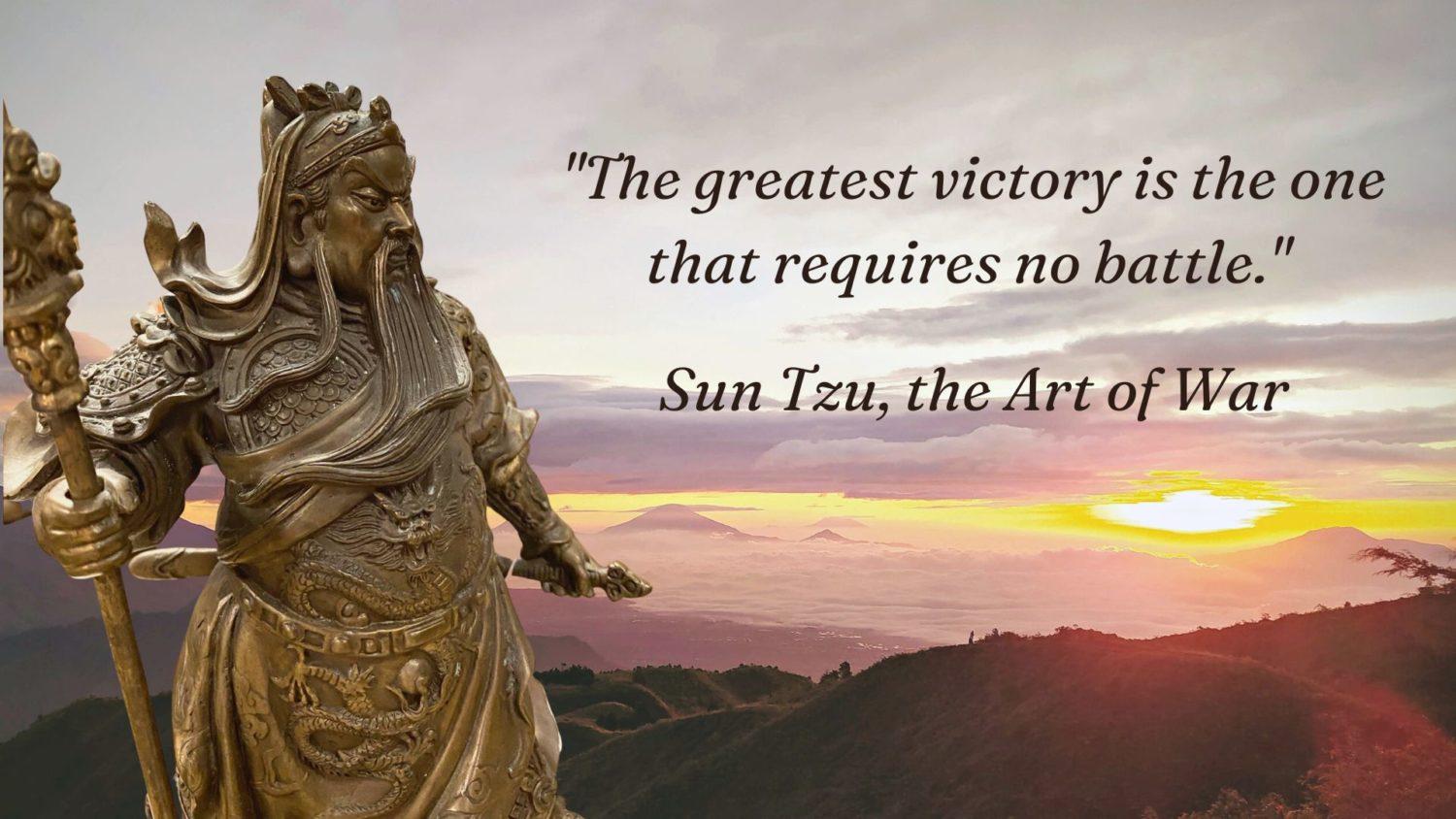 End of Chapter 1
End of Chapter 1
Resources:
sun_tzu_the_art_of_war Cleary
The-Art-of-War-by-Sun-Tzu-Giles
Sun_Tsu_The_Art_of_Warfare-Ames
https://archive.org/details/TheArtOfWarBySunTzu/mode/2up (Giles)
https://pattonhq.com/militaryworks/sun_tzu.html (Giles)
https://medium.com/@bharatbash123/how-to-develop-a-military-mindset-and-get-closer-to-your-goals-597fea5b18b3
About Srijana
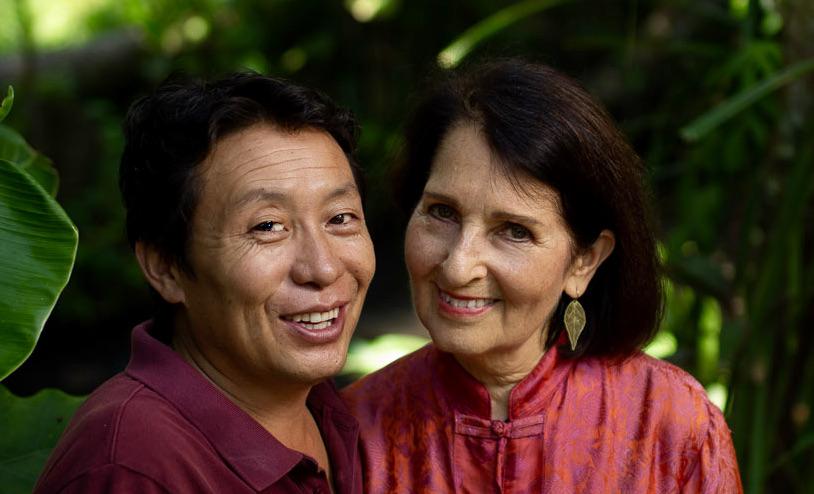 Srijana, aka Jane Barthelemy is a medical intuitive, Qigong teacher, author, and healer. She has practiced Tibetan Buddhist meditation for over five decades, residing in the Rudrananda Ashram in the USA for 35 years. She practices craniosacral therapy, Acunect, and BodyTalk – an infusion of intuitive Chinese, and Ayurvedic wisdom. She is trained in Qigong, Taichi, Daoist sexuality, and Kundalini activation. Her medical Qigong training is with Mantak Chia, Khamto Lee, Daniel Villasenor, Zhongxian Wu, Dr. Ka’imi Pilipovich, Franco Mescola, Richard Leirer, and Lam Kam Chueng. She has her BS in Italian Opera and MBA in financial management. Her two paradigm-changing cookbooks show how to build health with unprocessed foods. Her upcoming books include: “Heal Your Past Lives”, and “Buddha Speaks – Channeled Passages from the Master”. She is on the faculty of NewEarth University and LearnDesk. Her websites are FiveSeasonsMedicine.com and JanesHealthyKitchen.com. Srijana lives in Bali with her Bhutanese husband, Lama D.
Srijana, aka Jane Barthelemy is a medical intuitive, Qigong teacher, author, and healer. She has practiced Tibetan Buddhist meditation for over five decades, residing in the Rudrananda Ashram in the USA for 35 years. She practices craniosacral therapy, Acunect, and BodyTalk – an infusion of intuitive Chinese, and Ayurvedic wisdom. She is trained in Qigong, Taichi, Daoist sexuality, and Kundalini activation. Her medical Qigong training is with Mantak Chia, Khamto Lee, Daniel Villasenor, Zhongxian Wu, Dr. Ka’imi Pilipovich, Franco Mescola, Richard Leirer, and Lam Kam Chueng. She has her BS in Italian Opera and MBA in financial management. Her two paradigm-changing cookbooks show how to build health with unprocessed foods. Her upcoming books include: “Heal Your Past Lives”, and “Buddha Speaks – Channeled Passages from the Master”. She is on the faculty of NewEarth University and LearnDesk. Her websites are FiveSeasonsMedicine.com and JanesHealthyKitchen.com. Srijana lives in Bali with her Bhutanese husband, Lama D.


